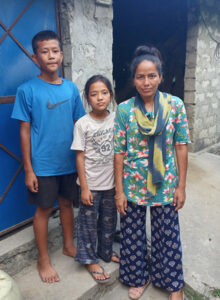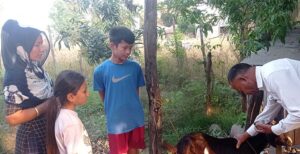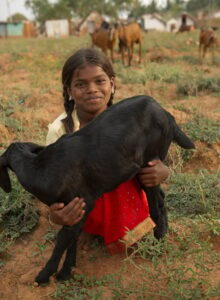Raise funds for Widows
There are many ways you can fundraise, whether it’s a bake sale, a marathon, or a party!
This website will offer limited functionality in this browser. We only support the recent versions of major browsers like Chrome, Firefox, Safari, and Edge.
With Robi’s income as a hotel chef, the family had lived comfortably. Their two children were well‐fed and were gaining an education. In a culture where women’s roles are typically confined to the domestic sphere, Myla had focused on caring for their children and their home.
She had depended on Robi for the family’s income. Now—at just 28 years old—Myla was alone, reeling with grief and seeing no way to adequately provide for her children.

Myla (pictured) struggled to provide for her children after her husband’s sudden death.
Myla had no family nearby. Robi’s family hadn’t approved of their marriage because of Myla’s social standing, so the couple had moved to another region.
Now Myla faced another discrimination: widowhood. Already devastated by the loss of her husband, she must endure rejection and scorn because of this new title. Myla’s neighbors even claimed she had eaten her husband. Their disdain added to Myla’s pain and disparaged her heavy heart. Sadly, this treatment is common in a region where people often consider a widow an “ill omen” and might exclude her from public activities simply because she has lost her husband.
As a widow, Myla’s economic opportunities were severely limited. Fortunately, she had some land to cultivate. Many widows in her area, deprived of social and economic rights by the death of their husband, lose their property rights, too.
But the vegetables Myla grew didn’t yield enough income to support her children’s education. Determined her children would continue their schooling, Myla sought work elsewhere to supplement their income. Still, the three struggled to maintain their lives.
Myla had no family nearby. Robi’s family hadn’t approved of their marriage because of Myla’s social standing, so the couple had moved to another region.

GFA pastor Nilay (pictured) prayed blessings over Myla’s goat.
A faithful believer, Myla likely clung to her faith, praying for God to intervene in her situation. God knew the extent of her need and the hurt of her heart. Myla and Robi had been faithful to God with their finances, consistently giving their tithe and offerings. Surely God would provide for Myla and her children in Robi’s absence. As “father of the fatherless, a defender of widows” (Psalm 68:5), God began to work on Myla’s behalf through His people.
GFA missionary Hinda, leader of the local Women’s Fellowship, knew of Myla’s struggles and longed to help her dear sister. Contacting regional leadership, Hinda arranged for Myla to receive a pregnant goat. This goat could provide Myla with a regular income. Hardy animals, goats require little space and upkeep, and they multiply quickly.
Immediately, the weight of her children’s care became lighter as this hoofed creature shared the load. Joy filled Myla’s heart. With the help of this goat, Myla had hope for the future.
“Because I have this goat, I am able to move further in life,” Myla said. “I have a hope that I will be able to multiply this goat, and through it I will be able to provide [for] my children’s needs.”
Local GFA pastor Nilay prayed blessings over Myla’s goat. He was confident God would provide for this widow and her children through this bleating creature. Myla could use the goat’s manure to nourish her growing crops. Offspring could provide nourishment for her family or be easily sold.
As the goat multiplied, it could grow into a small herd, and the goats could provide nutritious meat. A great source for protein, goats’ lean meat includes iron, vitamin B12, zinc and potassium.
Gratitude filled Myla’s heart. God had proven Himself faithful. Myla resolved to steward well this blessing and committed to give back to God His portion of the goats and the income they were sure to bring.
Though she was a widow, Myla was neither alone nor destitute. She was cared for and loved. Her children would still be fed and educated, and they had hope for a better future, thanks to the provision God had sent through His people in the form of a goat.

An income-generating animal such as a goat can empower families to offer a better future to their children.
Many other families remain destitute. You can be a conduit of answered prayer that carries God’s love and faithfulness to these families in need. A single goat, or other income-generating animal, can lift a huge burden from families struggling to put food on the table. These animals can empower families to break a cycle of poverty, gain financial stability and offer a brighter future for their children and generations to come.
This Christmas, you can tangibly demonstrate Christ’s love to an impoverished family in Asia or Africa by providing such an animal. This gift will lighten their load—and it could transform their lives.
There are many ways you can fundraise, whether it’s a bake sale, a marathon, or a party!